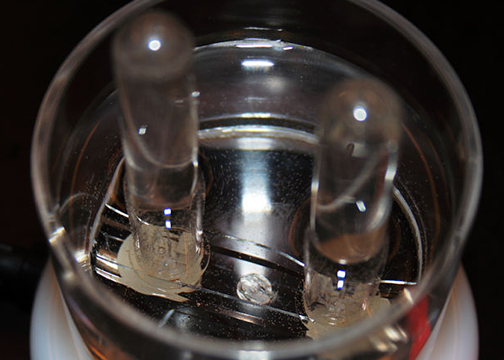June 5, 2015 [Evanston, IL] - ISEN is pleased to announce the recipients of its Spring 2015 Booster funding RFP. The proposed research addresses significant unmet needs with potential for transformative impact in the areas of sustainability and energy:
Dick Co, Managing Director, Solar Fuels Institute, proposes the Phase-1 research and development of CO2-to-ethanol conversion for the “Artificial Tree Project.” The overall project goal is to use concentrated solar photovoltaics to generate the electrical and thermal energy needed to drive water electrolysis for renewable hydrogen, direct air capture of CO2 and ultimately production of ethanol.
Omar Farha, Chemistry, and Massimiliano Delferro, Chemistry, will work to maximize the energy potential of light hydrocarbons (C3- C6), an underused byproduct of the oil and gas industry. Light hydrocarbons which could be a valuable energy feedstock if they are effectively transformed into higher molecular weight light fuel-range hydrocarbons. The team will test “super-acidic” sulfated metal-organic frameworks (MOFs) as catalysts for the transformation.
Derk Joester, Materials Science and Engineering, proposes initial research into sustainable cement, citing that the cement industry is responsible for ~7% of global CO2 emissions. Reducing the overall clinker content or introducing low carbonate clinkers can reduce emissions by up to 50%, however the strength development of concretes is not well understood. The team will characterize the composition and structure of the surface of layer C3S particles, a proposed contributor to the drop in hydraulic reactivity in cement.
Aaron Packman, Civil and Environmental Engineering, will work with Bill Miller, Chemical and Biological Engineering to form a new partnership between Northwestern, Argonne National Laboratory, and The Nature Conservancy to instrument TNC’s Indian Boundary Prairies and the nearby restored Big Marsh park, and to develop stochastic modeling tools to predict stormwater storage and water quality dynamics at these sites. The research will link data collection with predictive, data-based model frameworks for interactions between engineered infrastructure and natural water bodies and ecosystems.
Jinsong Wu, Materials Science and Engineering, proposes to establish a platform technology allowing in-situobservation of microstructural evolutions of miniature lithium-ion batteries operated inside transmission electron microscopes. This research will contribute new understanding of battery life and stability and will provide critical guidance in developing advanced and safe batteries, which can be used in electrical vehicles and backup power for renewable energy sources.
ISEN awards Booster funding in the spring and fall. Applicants are invited to submit proposals up to $45,000 for one year. Click here for more information on ISEN faculty funding.



